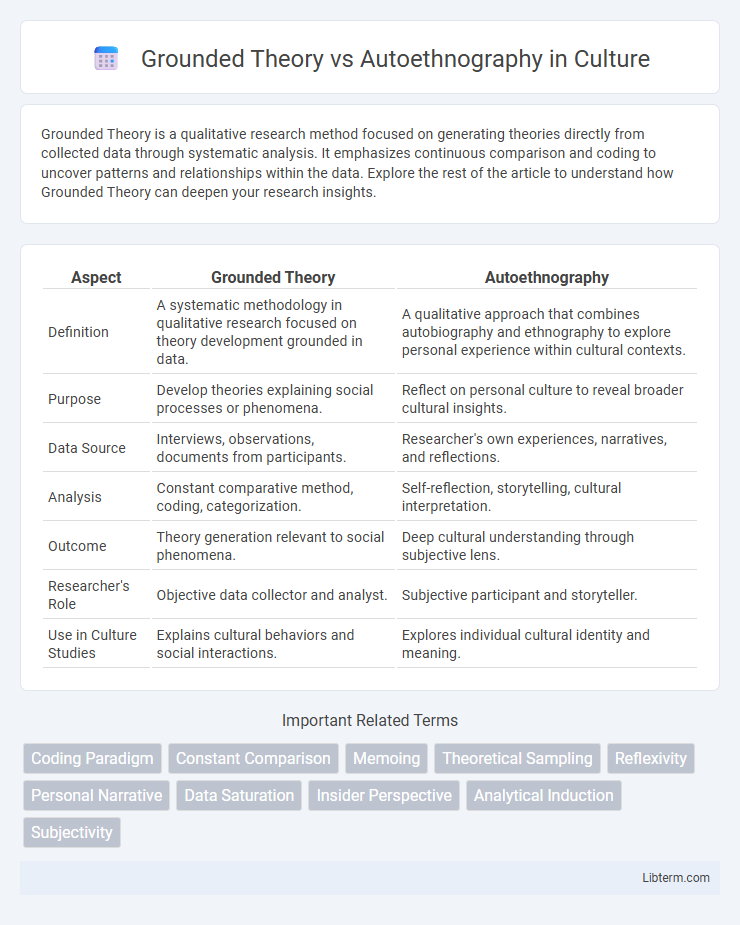Grounded Theory is a qualitative research method focused on generating theories directly from collected data through systematic analysis. It emphasizes continuous comparison and coding to uncover patterns and relationships within the data. Explore the rest of the article to understand how Grounded Theory can deepen your research insights.
Table of Comparison
| Aspect | Grounded Theory | Autoethnography |
|---|---|---|
| Definition | A systematic methodology in qualitative research focused on theory development grounded in data. | A qualitative approach that combines autobiography and ethnography to explore personal experience within cultural contexts. |
| Purpose | Develop theories explaining social processes or phenomena. | Reflect on personal culture to reveal broader cultural insights. |
| Data Source | Interviews, observations, documents from participants. | Researcher's own experiences, narratives, and reflections. |
| Analysis | Constant comparative method, coding, categorization. | Self-reflection, storytelling, cultural interpretation. |
| Outcome | Theory generation relevant to social phenomena. | Deep cultural understanding through subjective lens. |
| Researcher's Role | Objective data collector and analyst. | Subjective participant and storyteller. |
| Use in Culture Studies | Explains cultural behaviors and social interactions. | Explores individual cultural identity and meaning. |
Introduction to Qualitative Research Methods
Grounded Theory and Autoethnography are prominent qualitative research methods emphasizing different approaches to data collection and analysis within social sciences. Grounded Theory systematically develops theories grounded in empirical data through iterative coding and constant comparison, offering a structured framework for generating explanatory models. Autoethnography centers on the researcher's personal experience as a primary data source, blending autobiography with cultural analysis to provide deep insights into social phenomena from an insider perspective.
Defining Grounded Theory
Grounded Theory is a systematic qualitative research methodology focused on generating theories through the collection and analysis of empirical data. It emphasizes iterative data coding, constant comparison, and theoretical sampling to uncover patterns and concepts grounded directly in the data. This approach contrasts with Autoethnography, which centers on personal narrative and self-reflection to explore cultural experiences.
Defining Autoethnography
Autoethnography is a qualitative research method that combines self-reflection and ethnographic analysis to explore personal experiences within a cultural context. It emphasizes the researcher's subjective narrative to offer deeper insights into social phenomena, contrasting with Grounded Theory's systematic approach to generating theory from data. Autoethnography integrates storytelling and critical self-examination, making it a powerful tool for understanding identity, culture, and emotions.
Philosophical Foundations
Grounded Theory is rooted in pragmatism and symbolic interactionism, emphasizing systematic data collection and theory development from empirical evidence. Autoethnography aligns with constructivism and interpretivism, focusing on the researcher's personal experience to explore cultural and social phenomena. The philosophical foundation of Grounded Theory involves objectivity and emergent theory generation, while Autoethnography prioritizes subjectivity and reflexivity in understanding meaning.
Researcher’s Role and Reflexivity
Grounded Theory requires the researcher to actively engage in data collection and iterative analysis while maintaining a critical, systematic stance to develop theories grounded in empirical evidence. Autoethnography emphasizes the researcher's personal experience and self-reflection, prioritizing subjectivity and emotional insight as central to understanding cultural phenomena. Reflexivity in grounded theory involves ongoing methodological rigor and theory refinement, whereas autoethnography demands deep introspection and transparency about the researcher's influence on knowledge construction.
Data Collection and Analysis Approaches
Grounded Theory employs systematic data collection through interviews, observations, and documents, followed by iterative coding and constant comparison to develop a theory grounded in the data. Autoethnography relies on self-reflective narratives and personal experiences as primary data, analyzed through thematic exploration and cultural context interpretation. While Grounded Theory prioritizes objective data triangulation, Autoethnography emphasizes subjective insight and emotional resonance in data analysis.
Strengths of Grounded Theory
Grounded Theory excels in systematically generating theory directly from qualitative data through iterative coding and constant comparison, ensuring that findings are deeply rooted in empirical evidence. It offers structured procedures for data collection and analysis, enhancing the credibility and replicability of research outcomes. This approach is particularly effective in exploring social processes and developing explanatory models that can inform practice and policy across various disciplines.
Strengths of Autoethnography
Autoethnography excels in providing deep, personal insights by combining self-reflection with cultural analysis, allowing researchers to connect individual experiences to broader social contexts. This qualitative method emphasizes rich, narrative data, enhancing emotional resonance and authenticity often absent in more structured approaches like Grounded Theory. Its strength lies in foregrounding the researcher's voice, fostering empathy, and illuminating complex human behaviors through lived experience.
Limitations and Challenges
Grounded Theory faces challenges in maintaining objectivity as researchers must continually analyze and code data without preconceived hypotheses, which can lead to bias or overly complex theories. Autoethnography struggles with issues of subjectivity and self-representation, often criticized for lacking generalizability due to its focus on personal experience. Both methodologies require extensive time commitments and demand rigorous reflexivity to balance personal insights with academic rigor.
Choosing Between Grounded Theory and Autoethnography
Choosing between Grounded Theory and Autoethnography depends on the research focus and methodology preferences. Grounded Theory is ideal for generating theoretical frameworks from systematically collected qualitative data, emphasizing data coding and constant comparison. Autoethnography suits researchers aiming to explore personal experiences within cultural contexts, blending autobiography with ethnographic analysis for deeper self-reflective insights.
Grounded Theory Infographic

 libterm.com
libterm.com